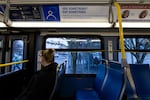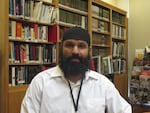Eqra Raza has been riding public transportation in Portland for most of her life — 11 years to be exact.
Raza, 18, is Pakistani-American and wears a hijab. She was born and raised in Southeast Portland. She began riding the bus in second grade, with her siblings and her cousin to the Muslim Educational Trust, or MET, a community organization in Tigard that houses an Islamic school. Raza is now a high school senior there.

Eqra Raza is a senior at the Muslim Educational Trust in Tigard, Oregon. Raza, 18, rides the TriMet bus everyday for two hours to get to and from school. She says she's always been on guard and has been treated differently for riding public transit while wearing a head scarf.
Kaylee Domzalski / OPB
Raza’s family members have graduated, and since the start of this school year, she’s been riding the bus alone.
About a week into this school year, Raza felt extra nervous riding the bus alone on Sept. 11, the anniversary of the terror attack.
“I texted my sister and was like, ‘I feel really scared. I feel like I should take my scarf off because I’m by myself,’” she said.
Her sister told her to do whatever made her feel best. She ended up keeping her head-covering on.
“It’s kind of sad that we live in a country where we have to hide ourselves because of our religion or who we are,” she said.
The Fear Of Riding Alone
When Raza rides the bus alone, she tucks herself into the very back corner, by a window. This is her go-to seat, she said, where she feels she can be out of the way and mind her own business.
Every weekday she has about a two-hour commute from Portland to Tigard and back.
She said she’s heard racist and Islamophobic comments from people during her travels, but a lot of the time it’s just stray looks and people opting not to sit next to her, even if the bus is full.

A sign on a TriMet bus from Tigard, Oregon, to downtown Portland urges passengers to call emergency services in cases of unsafe situations.
Kaylee Domzalski / OPB
“No matter what we do we’re always going to be looked at differently and treated differently because we wear the scarf,” Raza said.
She recalled one experience riding the bus last year with her cousin when an older woman approached them, speaking slowly and asking them if they spoke English.
“I was born here and I was raised here, I went to school here and how are you going to tell me that I’m different than you are just because I’m wearing a scarf?” Raza said.
She said a man interjected and the situation cooled down. Raza and her cousin moved to another spot on the bus.
But not all conflicts have deescalated like Raza’s.
Hate On The Train
It's been about two and a half years since Jeremy Christian allegedly stabbed and killed two men and injured another on a Portland MAX train.
Witnesses said Christian was shouting racist comments while two young black women were nearby. One woman was wearing a hijab just like Raza’s.
Christian is also accused of harassing and assaulting Demetria Hester, an African-American woman, on a MAX train the day prior. Christian is set to go on trial for those crimes this month.
Raza remembers the day she heard about the deadly attack. She and her cousin had just ridden that same MAX line about a week earlier.
“We couldn’t put into words what had happened,” Raza said. “There could have been any chance that would’ve been us. We were on that MAX, that could’ve been us. We were so scared. We didn’t ride the MAX for two or three months after that.”
Jawad Khan is a board member at the Muslim Educational trust. He’s Raza’s teacher. He also vividly remembers that day.
“At first it was ‘How could this happen?’ Second was, ‘Yeah, we know this exists here, even here.’ And third was ‘Well, what are we going to do to address this?’” he said.

Jawad Khan is a board member and teacher at the Muslim Educational Trust in Tigard, Ore.
Meerah Powell / OPB
MET worked to unify the Muslim community, communities of color and white people around Portland after the attack, he said.
“Especially after this, we want to take something that was tragic and turn it into something that means something — the legacy of the men who died and the man who survived and the girls who were affected and to have a lasting effect for something that is positive,” Khan said.
Still, he said, the attack shook the Muslim community and its sense of safety.“When certain things happen, it’s that moment of that and then we go back to our routine,” Khan said. “But, unfortunately for us, our routine is constant vigilance.”
He continued: “I think there is this greater heightened sense of [fear], but it’s always been there.”
A Change In Strategy
The attack has also inevitably affected TriMet, the agency that operates the public transit system in the Portland Metro Area.
It illuminated safety concerns from many in the community and led to litigation against the agency.
The families of the two men who were killed in the attack filed separate lawsuits against TriMet and the Portland Police Bureau for a total of $20 million, claiming the agencies should have taken more action to protect riders. That litigation is ongoing.
“The May 2017 attack has had a very lasting impact on TriMet,” Roberta Alstadt, TriMet’s communications manager, said.
Related: Powerful Evidence Raises Question About Legal Approaches To MAX Murder Trial
She said the agency has increased security efforts in multiple ways in the years since the attack.
“We have increased our security presence, maximizing the time that we have security officers and our own personnel on the system interacting with riders and providing help if needed,” Alstadt said.
The agency has doubled the time its contracted security officers are working — now they average about 3,000 hours a week on the system, she said. TriMet’s also added lighting and more than 7,000 cameras throughout the system.
Additionally, Alstadt said TriMet has a transit equity advisory committee made up of people that represent underprivileged communities. That group, which meets monthly, offers guidance to TriMet’s general manager on issues of accessibility and inclusion.
“We want everyone to feel that they can ride transit,” Alstadt said. “We continuously evaluate how we can adjust our efforts to achieve that, but we want to do it in a compassionate and effective way.”
She said the agency also considers that having more security officers on transit could negatively impact people of color.
“While one rider may want to see a police officer every day, others may not,” Alstadt said. “So we will continue to work with the communities of color and disadvantaged communities, our transit equity advisory committee and stakeholders on ways that we can improve the experience for all of our customers.”
Far From An Isolated Event
Still, TriMet’s efforts may not be enough — the MAX train stabbing is not the only incident that's taken place on TriMet vehicles or property.
Earlier this month a Multnomah County grand jury indicted a woman for allegedly attacking and harassing a Saudi Arabian foreign exchange student wearing a hijab. That happened at a downtown Portland MAX train station.

Memorial at the Hollywood Portland MAX station in 2017.
Bradley W. Parks / OPB
Late last year a man allegedly beat a woman with a skateboard on a bus. There have also been reported assaults on TriMet drivers and operators.
Raza said safety is a broad societal issue, especially for people of color and other underrepresented communities.
“I don’t really think TriMet can do anything,” she said. “I feel like people just have to [realize] this is everyone’s country and we all belong here.”
Raza’s teacher, Khan, said the Muslim community continues to feel the impact of the 2017 attack, but he hopes that attack, and Christian’s upcoming trial, opens people’s eyes to the racist and xenophobic ideologies that exist in the community.
“This is a hate crime, this should be a moment of reflection for everyone to say ‘Yes, this is out there,’” he said.
“It’s a wake up call to see, ‘Listen, it’s not just rosy and perfect and completely progressive, liberal, Elysian Fields over here. There are things that need to be addressed.’”
Khan said the Muslim community will be watching the trial very closely, especially for the way Christian will be discussed and portrayed.
Related: As School Hate Incidents Continue, Portland Public Schools Has A Plan
“When you are in a community of color, you lose the freedom of individuality, because when you do something, it’s ‘All Muslims did this,’ or ‘All people from here did this.’ ‘All people of this race did this,’” Khan said.
“But when you are not from a community of color, you have the blessing and the gift of individuality because there’s this history — ‘They might be mentality ill.’ ‘They were abused,’ this and this and this — which may all be true,” he said, “but the same extenuating circumstances are not afforded to other groups and they’re not labeled that way. They’re not portrayed that way either.”
Khan said he hopes to see people continuing to come together in solidarity with the groups affected by the 2017 attack and similar incidents.
“Support them. Show up at events. Support them monetarily, and if not anything else, ideologically,” he said. “Share on social media. Talk about it. This is how you be an ally.”
Jury selection for Christian’s trial is slated to begin Jan. 21. The trial is set to begin the following week. The trial is expected to last a month.
Christian faces more than a dozen felony and misdemeanor charges.
